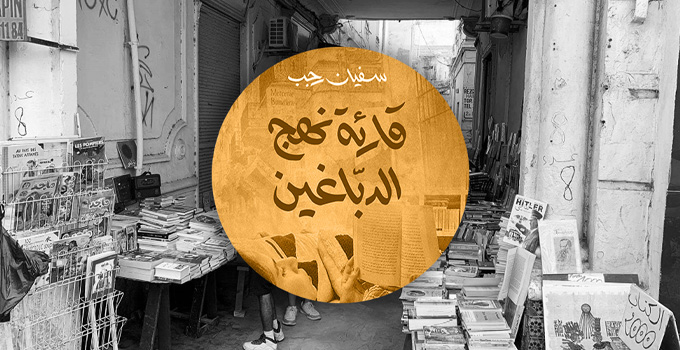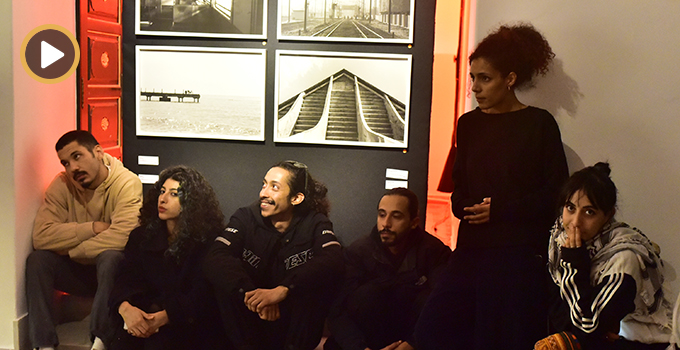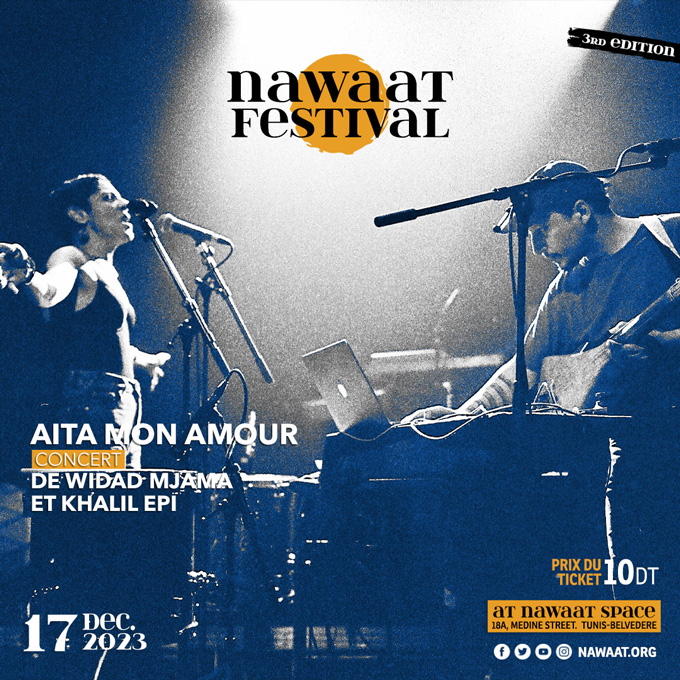Debo was founded in 2012 as physical space to host experimental musicians and underground artists, a sort of an urban “storehouse” for different musical genres. It merged with existing artistic groups like ART Solution, a Tunisian association which brings together different artists in efforts to promote street art and alternative urban cultures as well as to create a safe space for meeting and knowledge sharing. This is how Souhayla Mansour, cultural entrepreneur and one of the leading members of Debo, introduces us the story of how the collective was formed. “Debo is an independent, self-funded collective. We cannot speak of a single editorial line shaping our content, but rather of a humanist movement that is inspired by the universal values of human rights”, she adds.

Located in Houcine Bouzaiene street in the heart of downtown Tunis, Debo’s headquarters is a tiny three-room apartment. One room serves as a studio where artists have free access to recording music and making mixtapes. The walls, furniture and every square inch of space are covered with stickers, graffiti and “special touches” left by anyone who has passed through. Some of the rooms look chaotic, but it’s a beautiful chaos that somehow makes sense, that screams, that is full of sound. Souhayla tells us that “Debo is such a special space, a place for creation and co-working, a home for all artists that never closes its doors. It’s open 24 hours, you’ll find people recording music and editing videos at any time of day or night”.

Community and creation
According to Souhayla, Debo’s active members number between 30 to 50 rappers, singers, beatmakers, DJs, Bboys, taggers, photographers and video makers among others. “Debo’s artists are active because they’re part of an honest self-motivated community that gives them constructive feedback. They know they can rely on each other when needed. DEBO is indeed a community. There is a lot of solidarity and collaboration amongst members. Group dynamics are based on mutual respect. We embrace the problem-solving mentality. Everyone can learn from everyone through a spontaneous hands-on learning approach. Members are encouraged and empowered to try new forms of expression and to engage in different artistic experiences” she elaborates.

Synda Jbeli, professional dancer and active DEBO member also emphasizes the strong sense of collaboration that prevails throughout the community. She describes continual brainstorming and constant exchange of ideas that make DEBO a space of mutual inspiration. The richness of the community and solidarity of its members has strengthened the collective’s sense of independence. Most of the high-quality video clips and documentaries produced by DEBO have a 0-dinar budget thanks to the availability of human resources. “We don’t have fixed roles: participation and performance in projects is spontaneous and pro-active. Anyone can throw in a new concept and everyone takes time to support the idea and help it grow. Members of Debo can have different opinions but you have to be ready to communicate your vision and defend your work”, explains Synda.
Just knock on the door
Both Souhayla and Synda describe how easy it was to join the collective: they literally just knocked on the door. They come from different backgrounds and work experiences, but both “dream and resist through art” as Synda says. Souhayla, who comes from a multidisciplinary background combining fine arts, space design and events organization, presents herself as a cultural entrepreneur, a person who works on seeking artistic solutions to social problems. She believes that alternative culture should be a catalyst of social change in post-revolutionary Tunisia. “The art created through Debo responds to the crisis of hope in Tunisia. What we are doing is political even if we are not doing politics”, she remarks.

Synda comes from a background in cinema but since the age of 14 has dedicated herself to contemporary and theatre dance. When she first joined the collective, she had never imagined that she would be making video clips. It happened in the most spontaneous way. Her story highlights the idea of reciprocal inspiration. The space offered Synda a convergence between lyrics, music, tags, image and video. Content created by the collective transcends all different art disciplines. When Synda listens to a song in the making, she immerses herself in the lyrics, sounds and universe created by the artist. This was the case when she first heard “You better don’t know” by Massi: listening to the lyrics, she felt “bel makloub”, which translates into something like “overturned” or “upside-down”, and which in Tunisian dialect symbolizes that everything is going wrong. Synda spoke a lot with the songwriter and suggested a video-clip for the song, which she ultimately filmed in a way that created a world literally overturned! “I work on quality and not quantity. I don’t care about the number of views on Youtube or social media platforms. I just want to follow through with an idea and bring it to life”, she recounts about her experimentation process. Besides “You Better Don’t know”, Synda has filmed two other video clips. The first was for “Tawqef rass” by Vipa featuring Massi which was selected during the hip hop festival organized by MUCEM in Marseille in 2015; the second was for the newly-released “Alem Bla emmali” by Tiga Black’Na, Vipa and Mourad Majoul.“Alem Bla emmali” is a good example of mutual inspiration between artists.

Debo through the gender lens
For years, the collective has been an innovative actor on the Tunisian hip hop scene, an accessible and outreach-focused community. Through inclusive projects such as DEBO MOOV, the group has worked on creating more venues for knowledge sharing with younger generations through workshops in beat-making and songwriting, or through initiatives like StreetLab, the first legal wall in Tunisia for graffiti artists who are often harassed and prosecuted by authorities. Nonetheless, we can’t ignore the fact that Debo’s list of rappers and singers, does not include women. Indeed, the same goes for most media coverage of the collective’s shows and activities. When we communicate this observation to Souhayla, she responds that DEBO is actually quite a mixed and balanced group when it comes to gender. “It is true though that there are no female rappers or singers at Debo. I think it’s due to social pressure. Female artists do not want to be associated with some music genres for different reasons: rap because of rappers way of life, metal because it’s “inappropriate”, dance because they have to work too late during the night. Women face double a stigma when it comes to artistic professions”. For Souhayla, the use of macho language in rap should be explored beyond face value: “the use of etymologically macho terminology is actually used in a gender neutral way by our artists”, she maintains.

For her part, Synda does not accept the idea that social pressure is the reason behind the reserved participation of women in Tunisia’s hip hop culture. She says that through her conversations with dancers from all around the world during her stays abroad, she came to the realization that family pressure is not unique to conservative societies: “I hate the role of victim and I am tired of sexist clichés. If Tunisian society still does not accept dance, it’s because we have not worked on it”, she affirms. “Tunisia is built on the shoulders of Tunisian women. Women are oppressed but they fight for their rights and freedoms in this country”, she adds. Synda believes in artists’ responsibility in changing mentalities and promoting dialogue: “As a dancer, you have to communicate well and defend your art. Dancers must speak with their audience and not close themselves in their own bubble. Come down from your stage and live with people. We don’t share that much with each other anymore in Tunisia and that’s a serious obstacle. It is crucial to restore the values of coexistence”.
She shares her personal story as a dancer, how her belief in the value of dialogue has been a key to defining her art and how she deals with her family and her audience: “Sure, my mom probably wanted me to become a doctor or something. I destroyed all her dreams, but now she is proud of me! During my career as a dancer, I found it very important to engage in conversations with everyone. I danced all over Tunisia from big cities to tiny villages and have never missed a chance to talk with people before or after shows”. Through such conversations, Synda says she has arrived at the realization that Tunisian society does not have a problem with dance and body expression. With the same commitment, she applies to her daily rehearsals, she goes the extra mile to raise awareness about her art. “Dance is not just about how the body moves”, she tells us. « There is reasoning behind each movement and gesture. Dance is an activity as intellectual as it is physical. It is one of the most consuming arts that require the artist to respect a rigorous work ethic. The only moment of pleasure I feel is during the premiere of the show, the moment I put all my energy into conveying a message to the world”, she declares.





iThere are no comments
Add yours